Leadership Philosophy: Application and Impact - BUS501 Reflection
VerifiedAdded on 2023/04/08
|8
|1729
|205
Essay
AI Summary
This reflective essay delves into the student's personal leadership philosophy, primarily focusing on a democratic leadership style. The essay outlines the student's leadership qualities, including a commitment to quality work, promoting free idea flow, fostering respect and trust, and upholding values and morality. It explores the impact of personal beliefs, such as trust in people and the ability to connect with others, on their leadership approach. The essay also provides a key experience from the student's past as a team captain. Furthermore, the essay identifies a key leadership issue related to critical decision-making and explains how the student, leveraging their democratic leadership skills, addressed the issue by encouraging team participation and sharing ideas to resolve conflict and motivate the team. The conclusion emphasizes the importance of risk-taking and adaptability in leadership.
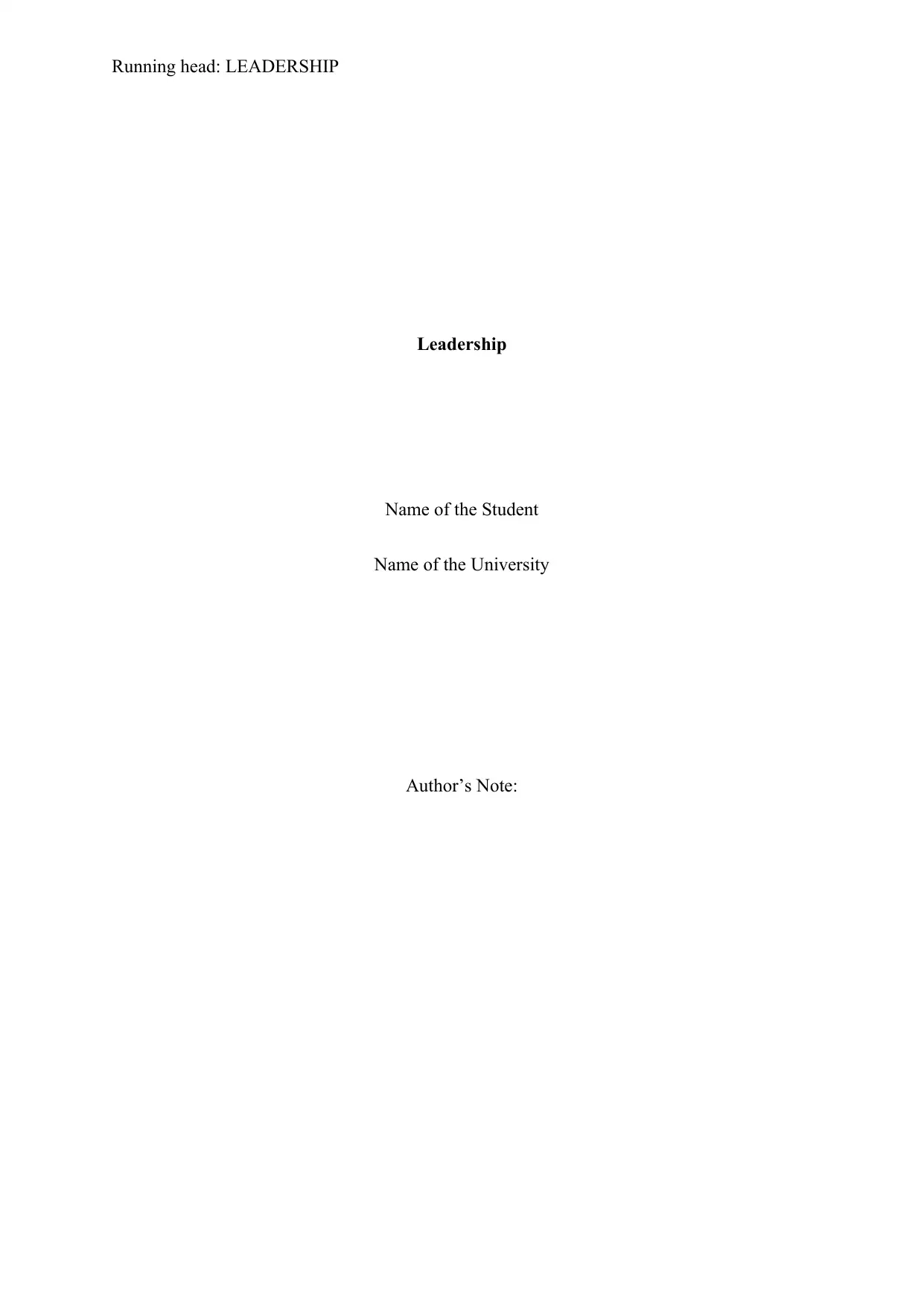
Running head: LEADERSHIP
Leadership
Name of the Student
Name of the University
Author’s Note:
Leadership
Name of the Student
Name of the University
Author’s Note:
Paraphrase This Document
Need a fresh take? Get an instant paraphrase of this document with our AI Paraphraser
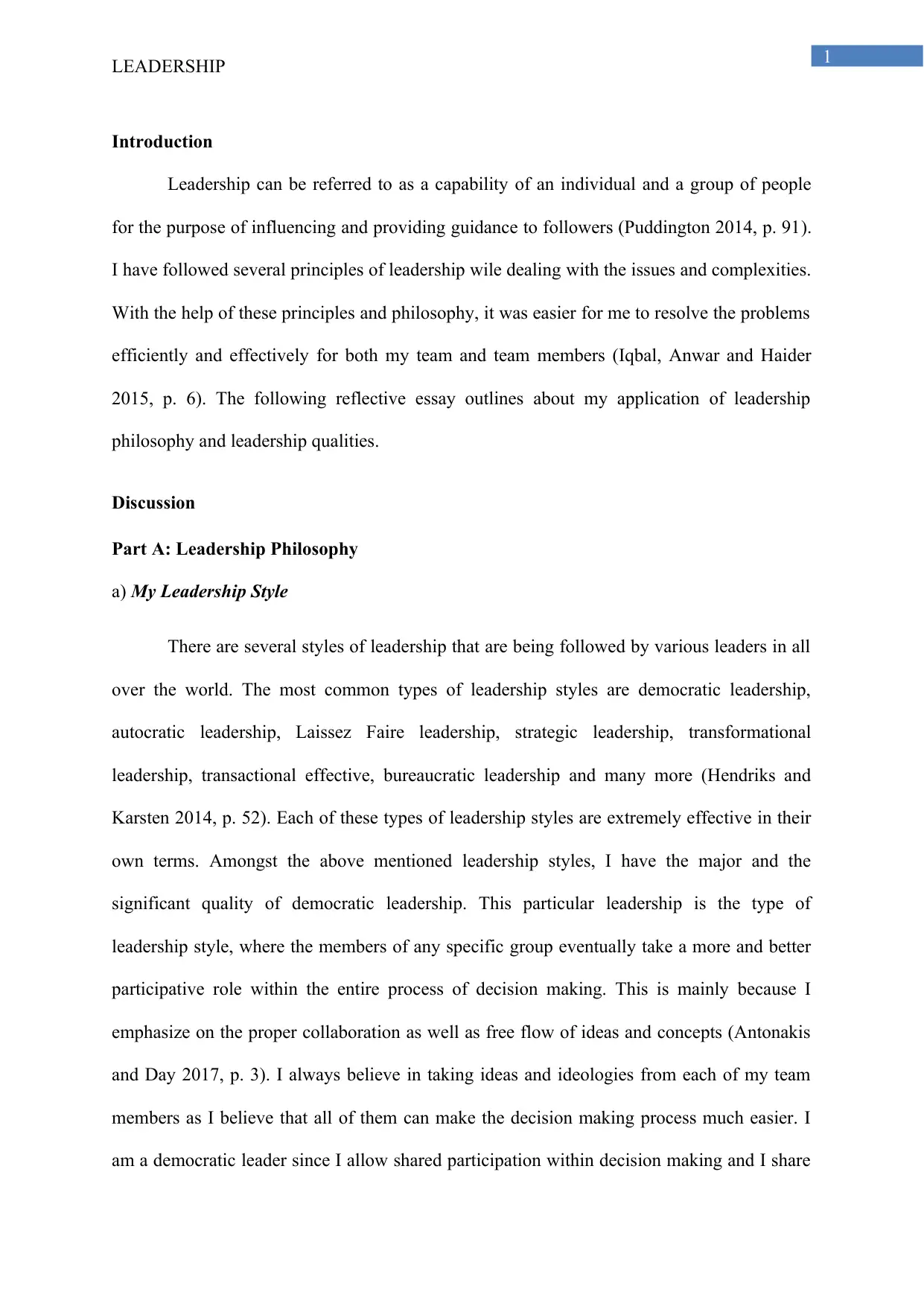
1
LEADERSHIP
Introduction
Leadership can be referred to as a capability of an individual and a group of people
for the purpose of influencing and providing guidance to followers (Puddington 2014, p. 91).
I have followed several principles of leadership wile dealing with the issues and complexities.
With the help of these principles and philosophy, it was easier for me to resolve the problems
efficiently and effectively for both my team and team members (Iqbal, Anwar and Haider
2015, p. 6). The following reflective essay outlines about my application of leadership
philosophy and leadership qualities.
Discussion
Part A: Leadership Philosophy
a) My Leadership Style
There are several styles of leadership that are being followed by various leaders in all
over the world. The most common types of leadership styles are democratic leadership,
autocratic leadership, Laissez Faire leadership, strategic leadership, transformational
leadership, transactional effective, bureaucratic leadership and many more (Hendriks and
Karsten 2014, p. 52). Each of these types of leadership styles are extremely effective in their
own terms. Amongst the above mentioned leadership styles, I have the major and the
significant quality of democratic leadership. This particular leadership is the type of
leadership style, where the members of any specific group eventually take a more and better
participative role within the entire process of decision making. This is mainly because I
emphasize on the proper collaboration as well as free flow of ideas and concepts (Antonakis
and Day 2017, p. 3). I always believe in taking ideas and ideologies from each of my team
members as I believe that all of them can make the decision making process much easier. I
am a democratic leader since I allow shared participation within decision making and I share
LEADERSHIP
Introduction
Leadership can be referred to as a capability of an individual and a group of people
for the purpose of influencing and providing guidance to followers (Puddington 2014, p. 91).
I have followed several principles of leadership wile dealing with the issues and complexities.
With the help of these principles and philosophy, it was easier for me to resolve the problems
efficiently and effectively for both my team and team members (Iqbal, Anwar and Haider
2015, p. 6). The following reflective essay outlines about my application of leadership
philosophy and leadership qualities.
Discussion
Part A: Leadership Philosophy
a) My Leadership Style
There are several styles of leadership that are being followed by various leaders in all
over the world. The most common types of leadership styles are democratic leadership,
autocratic leadership, Laissez Faire leadership, strategic leadership, transformational
leadership, transactional effective, bureaucratic leadership and many more (Hendriks and
Karsten 2014, p. 52). Each of these types of leadership styles are extremely effective in their
own terms. Amongst the above mentioned leadership styles, I have the major and the
significant quality of democratic leadership. This particular leadership is the type of
leadership style, where the members of any specific group eventually take a more and better
participative role within the entire process of decision making. This is mainly because I
emphasize on the proper collaboration as well as free flow of ideas and concepts (Antonakis
and Day 2017, p. 3). I always believe in taking ideas and ideologies from each of my team
members as I believe that all of them can make the decision making process much easier. I
am a democratic leader since I allow shared participation within decision making and I share
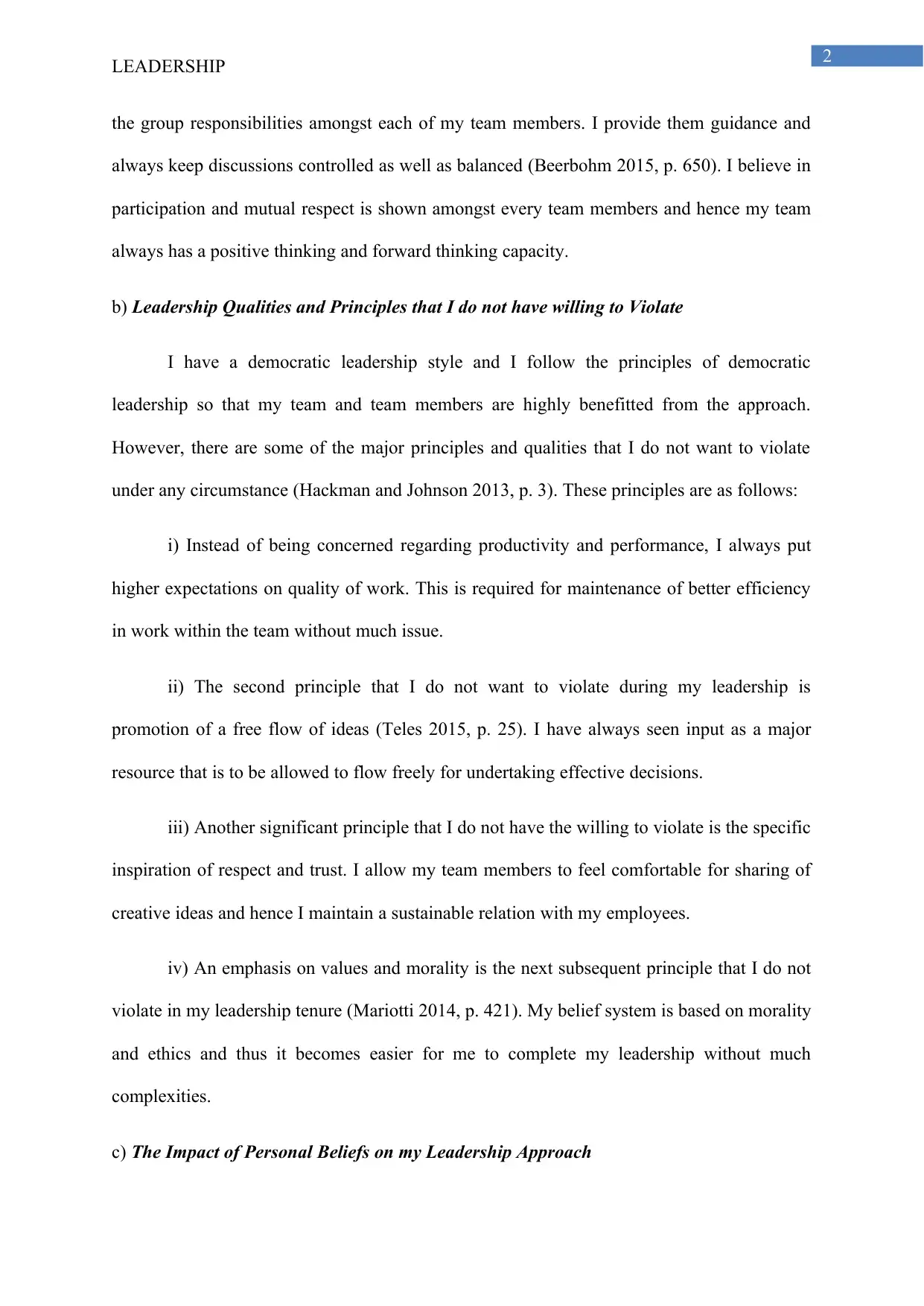
2
LEADERSHIP
the group responsibilities amongst each of my team members. I provide them guidance and
always keep discussions controlled as well as balanced (Beerbohm 2015, p. 650). I believe in
participation and mutual respect is shown amongst every team members and hence my team
always has a positive thinking and forward thinking capacity.
b) Leadership Qualities and Principles that I do not have willing to Violate
I have a democratic leadership style and I follow the principles of democratic
leadership so that my team and team members are highly benefitted from the approach.
However, there are some of the major principles and qualities that I do not want to violate
under any circumstance (Hackman and Johnson 2013, p. 3). These principles are as follows:
i) Instead of being concerned regarding productivity and performance, I always put
higher expectations on quality of work. This is required for maintenance of better efficiency
in work within the team without much issue.
ii) The second principle that I do not want to violate during my leadership is
promotion of a free flow of ideas (Teles 2015, p. 25). I have always seen input as a major
resource that is to be allowed to flow freely for undertaking effective decisions.
iii) Another significant principle that I do not have the willing to violate is the specific
inspiration of respect and trust. I allow my team members to feel comfortable for sharing of
creative ideas and hence I maintain a sustainable relation with my employees.
iv) An emphasis on values and morality is the next subsequent principle that I do not
violate in my leadership tenure (Mariotti 2014, p. 421). My belief system is based on morality
and ethics and thus it becomes easier for me to complete my leadership without much
complexities.
c) The Impact of Personal Beliefs on my Leadership Approach
LEADERSHIP
the group responsibilities amongst each of my team members. I provide them guidance and
always keep discussions controlled as well as balanced (Beerbohm 2015, p. 650). I believe in
participation and mutual respect is shown amongst every team members and hence my team
always has a positive thinking and forward thinking capacity.
b) Leadership Qualities and Principles that I do not have willing to Violate
I have a democratic leadership style and I follow the principles of democratic
leadership so that my team and team members are highly benefitted from the approach.
However, there are some of the major principles and qualities that I do not want to violate
under any circumstance (Hackman and Johnson 2013, p. 3). These principles are as follows:
i) Instead of being concerned regarding productivity and performance, I always put
higher expectations on quality of work. This is required for maintenance of better efficiency
in work within the team without much issue.
ii) The second principle that I do not want to violate during my leadership is
promotion of a free flow of ideas (Teles 2015, p. 25). I have always seen input as a major
resource that is to be allowed to flow freely for undertaking effective decisions.
iii) Another significant principle that I do not have the willing to violate is the specific
inspiration of respect and trust. I allow my team members to feel comfortable for sharing of
creative ideas and hence I maintain a sustainable relation with my employees.
iv) An emphasis on values and morality is the next subsequent principle that I do not
violate in my leadership tenure (Mariotti 2014, p. 421). My belief system is based on morality
and ethics and thus it becomes easier for me to complete my leadership without much
complexities.
c) The Impact of Personal Beliefs on my Leadership Approach
⊘ This is a preview!⊘
Do you want full access?
Subscribe today to unlock all pages.

Trusted by 1+ million students worldwide
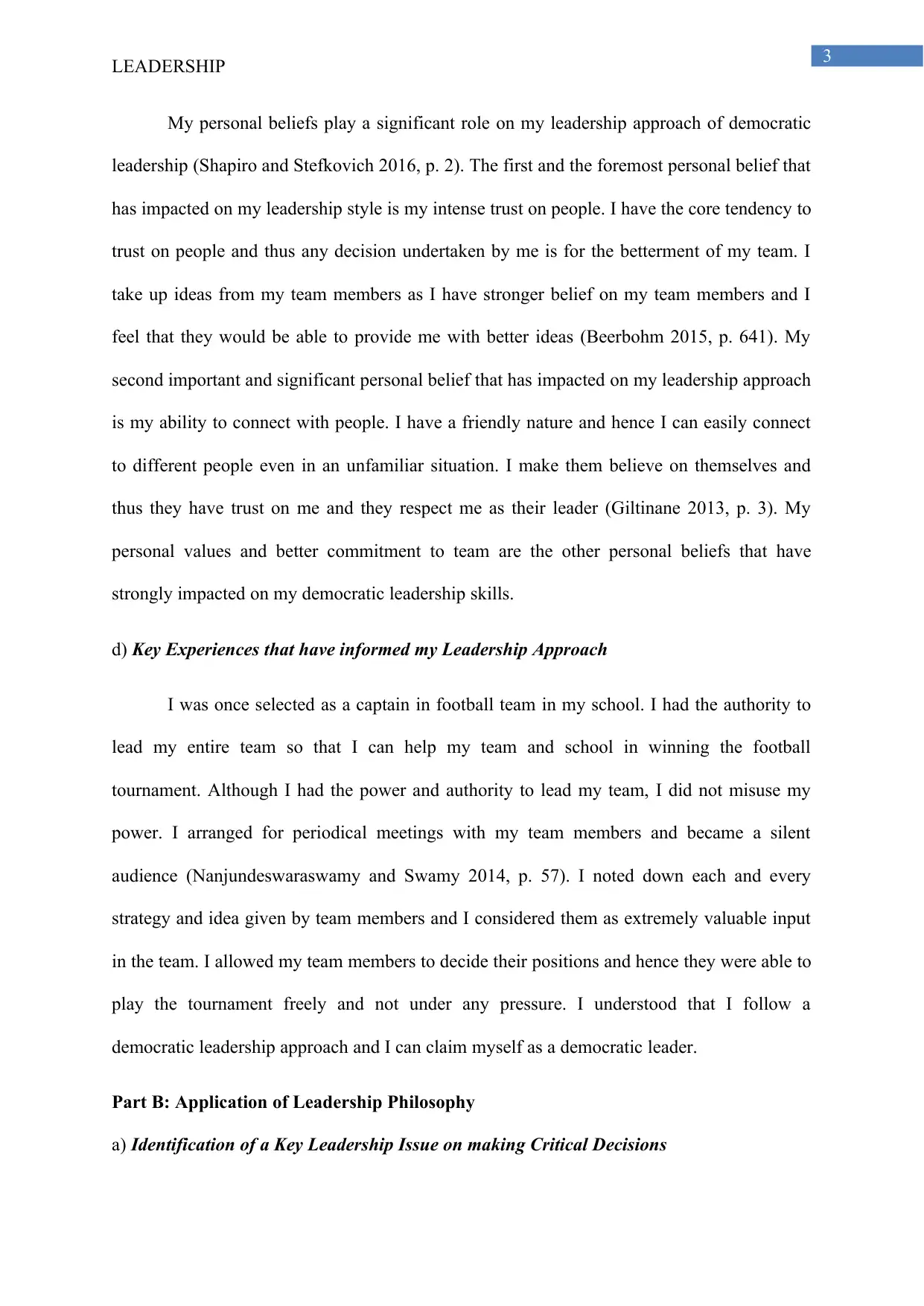
3
LEADERSHIP
My personal beliefs play a significant role on my leadership approach of democratic
leadership (Shapiro and Stefkovich 2016, p. 2). The first and the foremost personal belief that
has impacted on my leadership style is my intense trust on people. I have the core tendency to
trust on people and thus any decision undertaken by me is for the betterment of my team. I
take up ideas from my team members as I have stronger belief on my team members and I
feel that they would be able to provide me with better ideas (Beerbohm 2015, p. 641). My
second important and significant personal belief that has impacted on my leadership approach
is my ability to connect with people. I have a friendly nature and hence I can easily connect
to different people even in an unfamiliar situation. I make them believe on themselves and
thus they have trust on me and they respect me as their leader (Giltinane 2013, p. 3). My
personal values and better commitment to team are the other personal beliefs that have
strongly impacted on my democratic leadership skills.
d) Key Experiences that have informed my Leadership Approach
I was once selected as a captain in football team in my school. I had the authority to
lead my entire team so that I can help my team and school in winning the football
tournament. Although I had the power and authority to lead my team, I did not misuse my
power. I arranged for periodical meetings with my team members and became a silent
audience (Nanjundeswaraswamy and Swamy 2014, p. 57). I noted down each and every
strategy and idea given by team members and I considered them as extremely valuable input
in the team. I allowed my team members to decide their positions and hence they were able to
play the tournament freely and not under any pressure. I understood that I follow a
democratic leadership approach and I can claim myself as a democratic leader.
Part B: Application of Leadership Philosophy
a) Identification of a Key Leadership Issue on making Critical Decisions
LEADERSHIP
My personal beliefs play a significant role on my leadership approach of democratic
leadership (Shapiro and Stefkovich 2016, p. 2). The first and the foremost personal belief that
has impacted on my leadership style is my intense trust on people. I have the core tendency to
trust on people and thus any decision undertaken by me is for the betterment of my team. I
take up ideas from my team members as I have stronger belief on my team members and I
feel that they would be able to provide me with better ideas (Beerbohm 2015, p. 641). My
second important and significant personal belief that has impacted on my leadership approach
is my ability to connect with people. I have a friendly nature and hence I can easily connect
to different people even in an unfamiliar situation. I make them believe on themselves and
thus they have trust on me and they respect me as their leader (Giltinane 2013, p. 3). My
personal values and better commitment to team are the other personal beliefs that have
strongly impacted on my democratic leadership skills.
d) Key Experiences that have informed my Leadership Approach
I was once selected as a captain in football team in my school. I had the authority to
lead my entire team so that I can help my team and school in winning the football
tournament. Although I had the power and authority to lead my team, I did not misuse my
power. I arranged for periodical meetings with my team members and became a silent
audience (Nanjundeswaraswamy and Swamy 2014, p. 57). I noted down each and every
strategy and idea given by team members and I considered them as extremely valuable input
in the team. I allowed my team members to decide their positions and hence they were able to
play the tournament freely and not under any pressure. I understood that I follow a
democratic leadership approach and I can claim myself as a democratic leader.
Part B: Application of Leadership Philosophy
a) Identification of a Key Leadership Issue on making Critical Decisions
Paraphrase This Document
Need a fresh take? Get an instant paraphrase of this document with our AI Paraphraser
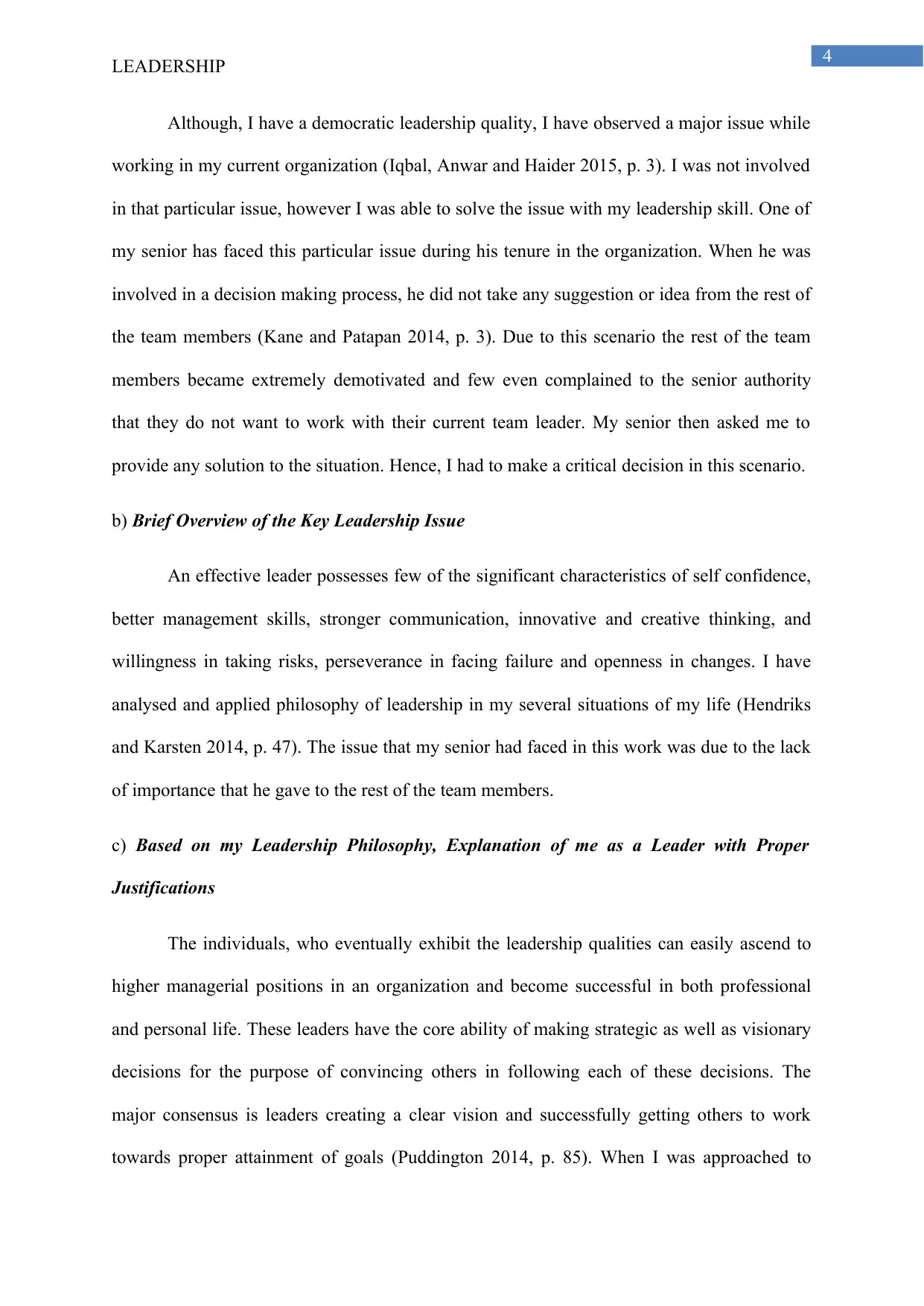
4
LEADERSHIP
Although, I have a democratic leadership quality, I have observed a major issue while
working in my current organization (Iqbal, Anwar and Haider 2015, p. 3). I was not involved
in that particular issue, however I was able to solve the issue with my leadership skill. One of
my senior has faced this particular issue during his tenure in the organization. When he was
involved in a decision making process, he did not take any suggestion or idea from the rest of
the team members (Kane and Patapan 2014, p. 3). Due to this scenario the rest of the team
members became extremely demotivated and few even complained to the senior authority
that they do not want to work with their current team leader. My senior then asked me to
provide any solution to the situation. Hence, I had to make a critical decision in this scenario.
b) Brief Overview of the Key Leadership Issue
An effective leader possesses few of the significant characteristics of self confidence,
better management skills, stronger communication, innovative and creative thinking, and
willingness in taking risks, perseverance in facing failure and openness in changes. I have
analysed and applied philosophy of leadership in my several situations of my life (Hendriks
and Karsten 2014, p. 47). The issue that my senior had faced in this work was due to the lack
of importance that he gave to the rest of the team members.
c) Based on my Leadership Philosophy, Explanation of me as a Leader with Proper
Justifications
The individuals, who eventually exhibit the leadership qualities can easily ascend to
higher managerial positions in an organization and become successful in both professional
and personal life. These leaders have the core ability of making strategic as well as visionary
decisions for the purpose of convincing others in following each of these decisions. The
major consensus is leaders creating a clear vision and successfully getting others to work
towards proper attainment of goals (Puddington 2014, p. 85). When I was approached to
LEADERSHIP
Although, I have a democratic leadership quality, I have observed a major issue while
working in my current organization (Iqbal, Anwar and Haider 2015, p. 3). I was not involved
in that particular issue, however I was able to solve the issue with my leadership skill. One of
my senior has faced this particular issue during his tenure in the organization. When he was
involved in a decision making process, he did not take any suggestion or idea from the rest of
the team members (Kane and Patapan 2014, p. 3). Due to this scenario the rest of the team
members became extremely demotivated and few even complained to the senior authority
that they do not want to work with their current team leader. My senior then asked me to
provide any solution to the situation. Hence, I had to make a critical decision in this scenario.
b) Brief Overview of the Key Leadership Issue
An effective leader possesses few of the significant characteristics of self confidence,
better management skills, stronger communication, innovative and creative thinking, and
willingness in taking risks, perseverance in facing failure and openness in changes. I have
analysed and applied philosophy of leadership in my several situations of my life (Hendriks
and Karsten 2014, p. 47). The issue that my senior had faced in this work was due to the lack
of importance that he gave to the rest of the team members.
c) Based on my Leadership Philosophy, Explanation of me as a Leader with Proper
Justifications
The individuals, who eventually exhibit the leadership qualities can easily ascend to
higher managerial positions in an organization and become successful in both professional
and personal life. These leaders have the core ability of making strategic as well as visionary
decisions for the purpose of convincing others in following each of these decisions. The
major consensus is leaders creating a clear vision and successfully getting others to work
towards proper attainment of goals (Puddington 2014, p. 85). When I was approached to
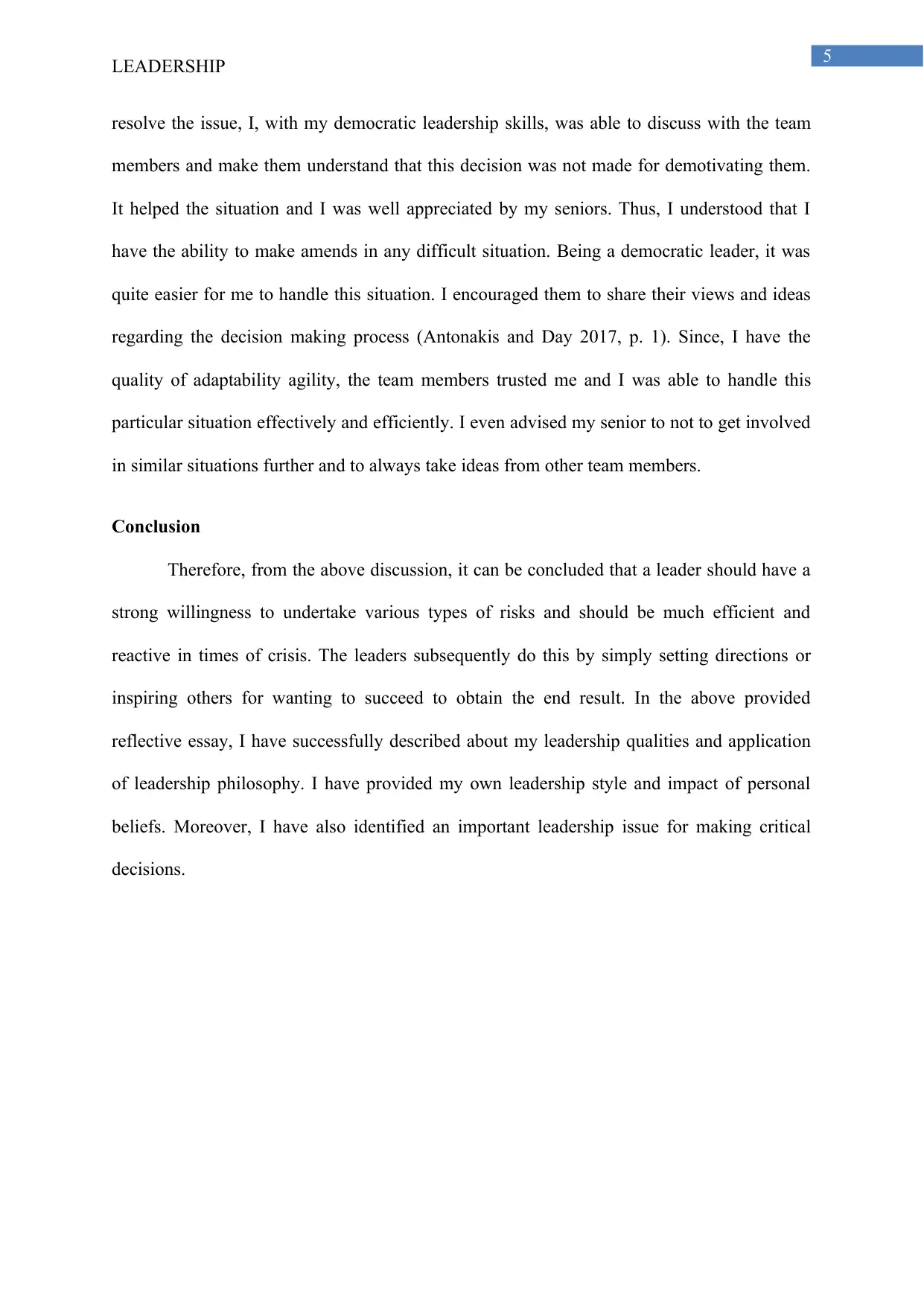
5
LEADERSHIP
resolve the issue, I, with my democratic leadership skills, was able to discuss with the team
members and make them understand that this decision was not made for demotivating them.
It helped the situation and I was well appreciated by my seniors. Thus, I understood that I
have the ability to make amends in any difficult situation. Being a democratic leader, it was
quite easier for me to handle this situation. I encouraged them to share their views and ideas
regarding the decision making process (Antonakis and Day 2017, p. 1). Since, I have the
quality of adaptability agility, the team members trusted me and I was able to handle this
particular situation effectively and efficiently. I even advised my senior to not to get involved
in similar situations further and to always take ideas from other team members.
Conclusion
Therefore, from the above discussion, it can be concluded that a leader should have a
strong willingness to undertake various types of risks and should be much efficient and
reactive in times of crisis. The leaders subsequently do this by simply setting directions or
inspiring others for wanting to succeed to obtain the end result. In the above provided
reflective essay, I have successfully described about my leadership qualities and application
of leadership philosophy. I have provided my own leadership style and impact of personal
beliefs. Moreover, I have also identified an important leadership issue for making critical
decisions.
LEADERSHIP
resolve the issue, I, with my democratic leadership skills, was able to discuss with the team
members and make them understand that this decision was not made for demotivating them.
It helped the situation and I was well appreciated by my seniors. Thus, I understood that I
have the ability to make amends in any difficult situation. Being a democratic leader, it was
quite easier for me to handle this situation. I encouraged them to share their views and ideas
regarding the decision making process (Antonakis and Day 2017, p. 1). Since, I have the
quality of adaptability agility, the team members trusted me and I was able to handle this
particular situation effectively and efficiently. I even advised my senior to not to get involved
in similar situations further and to always take ideas from other team members.
Conclusion
Therefore, from the above discussion, it can be concluded that a leader should have a
strong willingness to undertake various types of risks and should be much efficient and
reactive in times of crisis. The leaders subsequently do this by simply setting directions or
inspiring others for wanting to succeed to obtain the end result. In the above provided
reflective essay, I have successfully described about my leadership qualities and application
of leadership philosophy. I have provided my own leadership style and impact of personal
beliefs. Moreover, I have also identified an important leadership issue for making critical
decisions.
⊘ This is a preview!⊘
Do you want full access?
Subscribe today to unlock all pages.

Trusted by 1+ million students worldwide
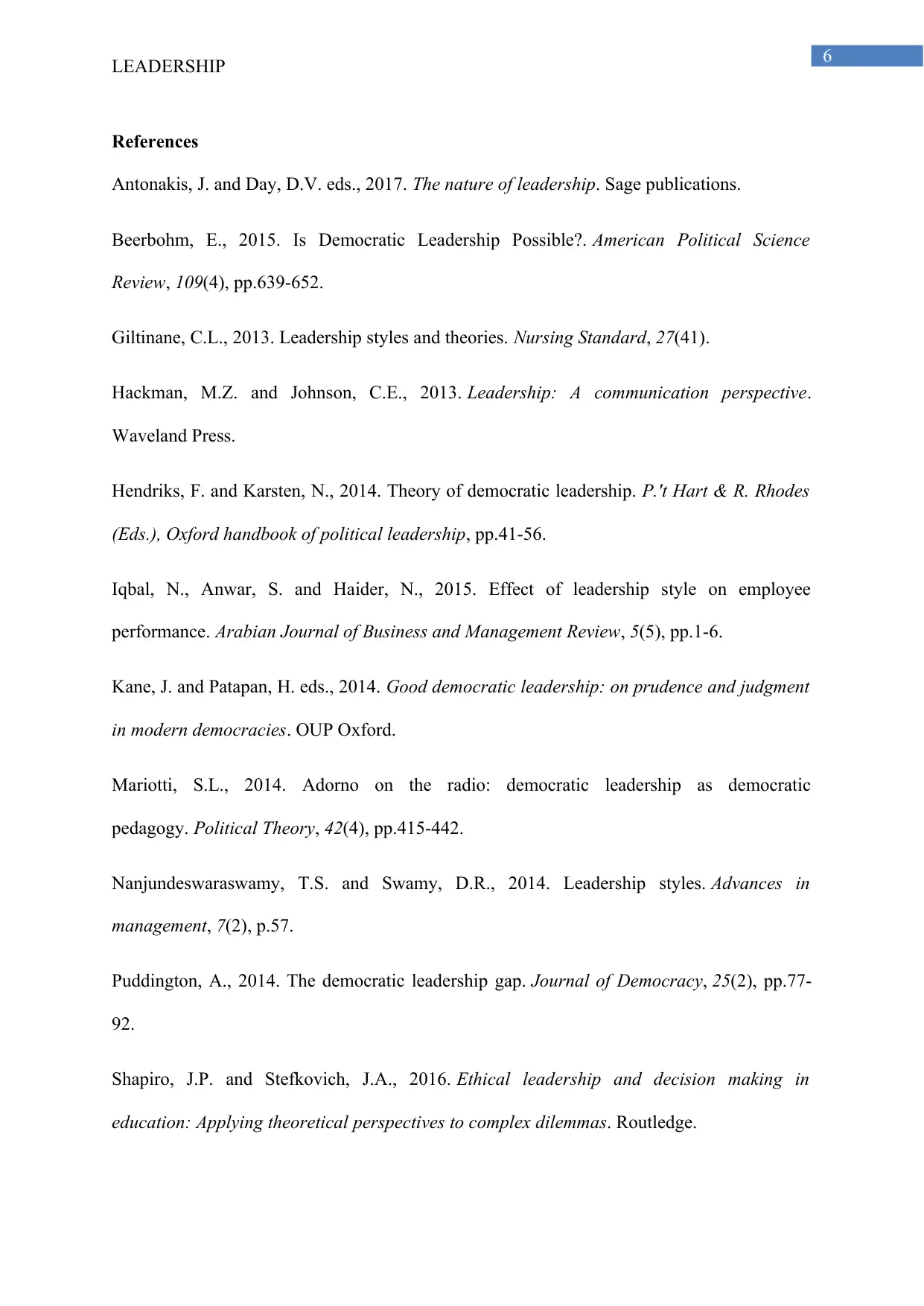
6
LEADERSHIP
References
Antonakis, J. and Day, D.V. eds., 2017. The nature of leadership. Sage publications.
Beerbohm, E., 2015. Is Democratic Leadership Possible?. American Political Science
Review, 109(4), pp.639-652.
Giltinane, C.L., 2013. Leadership styles and theories. Nursing Standard, 27(41).
Hackman, M.Z. and Johnson, C.E., 2013. Leadership: A communication perspective.
Waveland Press.
Hendriks, F. and Karsten, N., 2014. Theory of democratic leadership. P.'t Hart & R. Rhodes
(Eds.), Oxford handbook of political leadership, pp.41-56.
Iqbal, N., Anwar, S. and Haider, N., 2015. Effect of leadership style on employee
performance. Arabian Journal of Business and Management Review, 5(5), pp.1-6.
Kane, J. and Patapan, H. eds., 2014. Good democratic leadership: on prudence and judgment
in modern democracies. OUP Oxford.
Mariotti, S.L., 2014. Adorno on the radio: democratic leadership as democratic
pedagogy. Political Theory, 42(4), pp.415-442.
Nanjundeswaraswamy, T.S. and Swamy, D.R., 2014. Leadership styles. Advances in
management, 7(2), p.57.
Puddington, A., 2014. The democratic leadership gap. Journal of Democracy, 25(2), pp.77-
92.
Shapiro, J.P. and Stefkovich, J.A., 2016. Ethical leadership and decision making in
education: Applying theoretical perspectives to complex dilemmas. Routledge.
LEADERSHIP
References
Antonakis, J. and Day, D.V. eds., 2017. The nature of leadership. Sage publications.
Beerbohm, E., 2015. Is Democratic Leadership Possible?. American Political Science
Review, 109(4), pp.639-652.
Giltinane, C.L., 2013. Leadership styles and theories. Nursing Standard, 27(41).
Hackman, M.Z. and Johnson, C.E., 2013. Leadership: A communication perspective.
Waveland Press.
Hendriks, F. and Karsten, N., 2014. Theory of democratic leadership. P.'t Hart & R. Rhodes
(Eds.), Oxford handbook of political leadership, pp.41-56.
Iqbal, N., Anwar, S. and Haider, N., 2015. Effect of leadership style on employee
performance. Arabian Journal of Business and Management Review, 5(5), pp.1-6.
Kane, J. and Patapan, H. eds., 2014. Good democratic leadership: on prudence and judgment
in modern democracies. OUP Oxford.
Mariotti, S.L., 2014. Adorno on the radio: democratic leadership as democratic
pedagogy. Political Theory, 42(4), pp.415-442.
Nanjundeswaraswamy, T.S. and Swamy, D.R., 2014. Leadership styles. Advances in
management, 7(2), p.57.
Puddington, A., 2014. The democratic leadership gap. Journal of Democracy, 25(2), pp.77-
92.
Shapiro, J.P. and Stefkovich, J.A., 2016. Ethical leadership and decision making in
education: Applying theoretical perspectives to complex dilemmas. Routledge.
Paraphrase This Document
Need a fresh take? Get an instant paraphrase of this document with our AI Paraphraser
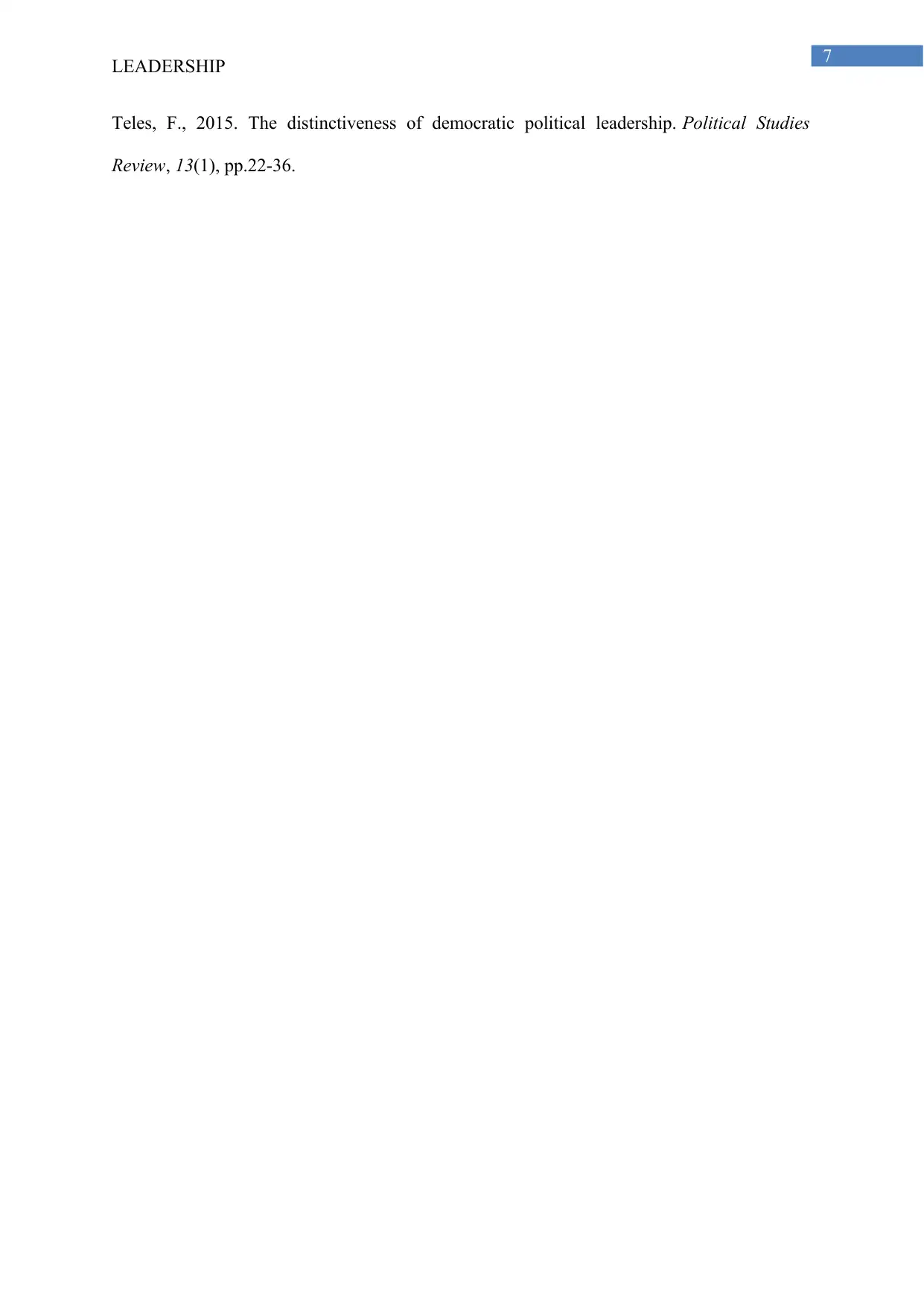
7
LEADERSHIP
Teles, F., 2015. The distinctiveness of democratic political leadership. Political Studies
Review, 13(1), pp.22-36.
LEADERSHIP
Teles, F., 2015. The distinctiveness of democratic political leadership. Political Studies
Review, 13(1), pp.22-36.
1 out of 8
Related Documents
Your All-in-One AI-Powered Toolkit for Academic Success.
+13062052269
info@desklib.com
Available 24*7 on WhatsApp / Email
![[object Object]](/_next/static/media/star-bottom.7253800d.svg)
Unlock your academic potential
Copyright © 2020–2026 A2Z Services. All Rights Reserved. Developed and managed by ZUCOL.





